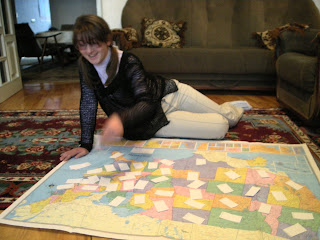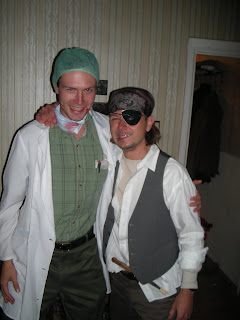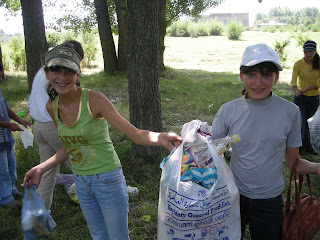 Sona, setting up the cards for US "Risk"
Sona, setting up the cards for US "Risk"
Among men “tsav’d tanem” may be the most used phrase, but among women it’s gotta be “Voi!” There’s the quick “Vie!”, emphasis on the “i”, expressing surprise. There’s a more drawn out version, with a longer “o” sound, often with voice raised, expressing disdain. And then there’s the repeated “voi voi voi!”, meaning “oh, my back!” and used when reaching for something deep under the couch. It is also used like “Wow!” when something is surprisingly good. Women will throw it in at the end of any slightly vexed sentence, no pause beforehand and no emphasis, like “Well then why don’t you get your ass in the kitchen and make some dinner voi.” My host sister Sona will yell it louder and louder over the phone with her best friend Julia when there’s a disagreement, sometimes throwing in a shrill, high-pitched “Khri?!”, a harsh and indignant cry meaning “why?” She also uses “Vekhk!” a lot, a rough and nasty sound, expressing absolute disgust.
My host family is great. I’ve been living with them for two and a half months now. Alla, the mom, is wonderful. She prepares all food, does all laundry and cleaning, keeps her teenagers in line, and on top of that lectures medical students at the local hospital six hours a day. She is an Armenian mom, and so keeps up a steady stream of questions: “are you cold?...are you hungry?...eat!...where are you going?...sit down!...let me do that...eat!” etc., but instead of being strict and stern she has a wonderful sense of humor and frequently laughs long and hard at herself and anyone else in range.
Alla’s domain, preserved from time immemorial, is the household. She is responsible for everything from shopping to getting up and bringing us a fork or a glass of water when we’re eating. She takes pride in her role, and feels more comfortable mopping or washing dishes than sitting around. She loves it whenever I make dinner or help with the dishes or just give her a heartfelt thank you.
Artak, the man of the house, is in charge of the cooking and heating gas flow for six of Martuni’s seventeen surrounding villages which stretch up and down the coast of Lake Sevan. In the family, his domain is breadwinning, building and repair. He works every day of the week for the gas company and spends every other minute either maintaining the house, repairing the car, or drinking a cup of tea or a tiny cup of coffee with a cigarette. (He does this many times a day, using the saucer as an ashtray.) He is generally laid back and speaks in a soft, low voice. Maybe once a week he comes home from drinking with his friends, a wild man: he howls, he rants, he hoots and hollers, lots of hugs and kisses for everyone and maybe a playful kick in the pants.
Artak and Alla’s daughter Sona is sixteen years old. She has light skin and brown hair and loves it when we’re together somewhere and people ask if she is an American. Her English is incredible, considering she has only seriously studied it for about a year. It is her secret language, and she uses it to talk to her friend Julia on the phone when they don't want anyone else to hear. Sometimes she forgets that I'm there, too.
Sona is very bright and in her last year of high school, which means that she rarely goes to school and instead spends hours every day at private lessons in English and Armenian language, or doing homework for them. She is a focused student, so much so that it is alarming how consumed she is by her trues loves: music television, clothes, and gossiping about her friends. She has a healthy but admittedly diminishing obsession with Brad Pitt. She will take exams this summer, hoping to get into one of the Universities in Yerevan and study to become a translator or a psychologist.
There is a dichotomy in Sona’s personality that I have trouble understanding. She has a great desire to learn and achieve in her classes, and a great capacity for hard study, yet when it comes to her personal life: friends or possessions or even card games, she is like an addict. Whenever something is unfavorable she whines and cries like an eight year old. However, when she is crying, she’s equally ready to burst into laughter at the smallest quip. (Literally. I don't know how better to describe this.) She sings sappy American or Armenian ballads all the time, and sometimes she sings “Oh, Darling!” (which she heard from me), annunciating each word with her Armenian accent. “Ohhhoh darliNG! Pleeese belEEVE me!” She hates most music I play, as I despise hers.
Her brother Hacob is fourteen, and he shows an admirable disregard for the rigors of his formal schooling. Armenian grade school classes are based on rote memorization and recitation in front of the class, a method that is often very stressful for the student. Imagine the child standing in front of the class, expected to recite last night’s lesson word for word, with the teacher correcting every false utterance or pause and the rest of the students shouting “Yes asem! Yes asem!” (“I’ll say! I’ll say!”) Most kids take rapid breaths, speaking awkwardly and without feeling, spitting out the words like a stock ticker, their eyes staring at nothing. But Hacob is somehow relaxed. He knows he’s not the best student and doesn’t try to be. Unlike his classmates he just doesn’t care enough or doesn’t marshal enough energy to get nervous about it.
For better or worse, this apathy tends to extend to the rest of his life as well. He’s a boy and so doesn’t do any housework, but he sometimes tags along and watches whatever Artak is fixing. He also rides and repairs bicycles in the summer with his friend, Narek. Otherwise, Hacob is a total slob, unapologetic. He’s skinny, goofy, and wears a shaggy mullet. He is apt to lie on the couch in the afternoon when the house is quiet and just make squelching noises to himself or mumble some song fragment, again and again, less and less intelligible each time, until it’s just noise and you’re sure something in his brain has ruptured and he’ll never speak true words again.
As a family, they’re close, very physical, always kissing or cuddling on the couch. They are affectionate, but volatile. Any disagreement is grounds for yelling. They yell at each other a lot, over the silliest things, in harsh tones that I can hardly believe. Yet once they’ve had their say, the argument can easily dissolve into laughter, as if there was nothing to it after all.
The apartment is small, but really nice. They have a western toilet, a gas water heater in the bathroom, nice furniture, two TVs, a fridge, and the only microwave I’ve seen in Armenia (which they almost never use). They speak both Armenian and Russian fluently, and sing songs together in both languages. One night early on in my stay when the power was out, we sat in the living room and sang for hours, Artak accompanying on the ancient guitar. My campaign against television is in full swing, but they're already used to watching several hours a day.
I joined the Peace Corps prepared for difficult living conditions, hardship, and struggle, but I didn't think the struggle would be against television and computer games. Ah well, take it as it comes. Armenia is one of the most developed Peace Corps countries, but fifteen years ago when they started here it was different. It was 1992, four years after the earthquake, during the war with Azerbaijan and the energy crisis. Water, elecricity, and gas were on and off at best, and all volunteers were placed in Yerevan (none live in Yerevan today). I heard that one volunteer, a former helicopter pilot, was tasked with rebuilding the airport's air control system. Today living conditions are much better, utilities are quite reliable, but there are still very few jobs. Most men live in Russia most of the year and send money home, coming back to their families for one to three months around Christmas.
This is one of the big reasons that David Barshes, the other volunteer living in Martuni, wants to renovate the Youth Center and hold mentoring, health, and anti-smoking classes, especially for the male youth whose fathers and older brothers aren't here. More about David and his Halloween party soon.
 Dprabak
Dprabak 
 the Cabin
the Cabin





 Enjoy!
Enjoy!

 We had a three day exhibition in a spare classroom, and the kids and teachers could vote on their favorite pieces. The response was incredible -- I think most of the six hundred kids of the school came in, looking, pointing, laughing, voting. They were so excited about shouting out their choice that even after the voting was closed they would shout at me: "I'm number 37! I'm number 6!" I was like, "That's great, good job."
We had a three day exhibition in a spare classroom, and the kids and teachers could vote on their favorite pieces. The response was incredible -- I think most of the six hundred kids of the school came in, looking, pointing, laughing, voting. They were so excited about shouting out their choice that even after the voting was closed they would shout at me: "I'm number 37! I'm number 6!" I was like, "That's great, good job."



































